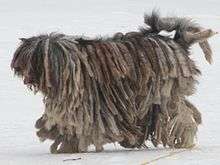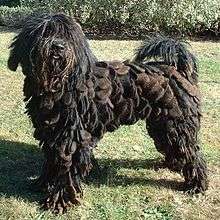Bergamasco Shepherd
 Bergamasco shepherd dog - a merle female | |||||||||||||||||||||||||||||
| Other names |
Bergamasco Shepherd Dog Bergamasco Cane da pastore Bergamasco | ||||||||||||||||||||||||||||
|---|---|---|---|---|---|---|---|---|---|---|---|---|---|---|---|---|---|---|---|---|---|---|---|---|---|---|---|---|---|
| Origin | Italy | ||||||||||||||||||||||||||||
| |||||||||||||||||||||||||||||
| |||||||||||||||||||||||||||||
| Domestic dog (Canis lupus familiaris) | |||||||||||||||||||||||||||||
The Bergamasco is a breed of dog with its origins in the Italian Alps near Bergamo, where it was originally used as a herding dog.
Appearance

The Bergamasco is a muscular, heavy-boned herding dog with a large head and a thick tail that hangs down to the hock and curves slightly upward at the end. The entire dog is covered with an abundant coat that forms mats. The Bergamasco is compact in profile but is just slightly longer than tall. The Bergamasco’s characteristic feature is its unique coat, made up of three types of hair. The coat forms flocks (strands of hair weaved together creating flat layers of felted hair) or loose mats, which cover the dog's body and legs, and protect the dog from weather and predators. The hair on the head is typically long and hangs over the eyes. [1]
Dogs stand 23½ inches and bitches 22 inches, measured at the withers. One inch taller or shorter than the ideal is acceptable. Males weigh between 70 and 84 pounds. Females weigh between 57 and 71 pounds. The Bergamasco is a muscular, heavy-boned herding dog with plenty of substance. The Bergamasco is very slightly longer than tall, with the length of body measured from point of shoulder to point of buttocks about 5 to 6 percent longer than the height measured at the withers.[1]
Coat and color
The breed's most distinctive feature is the unusual felted coat, a normal and healthy characteristic of the breed. The coat is characterized by three types of hair: a fine, dense, oily undercoat, long harsher hairs similar to a goat's and a top woolly outer-coat.[2] The three types of hair weave together as the dog gets older to form flat mats or flocks. The mats start from the spine and go down the flanks, growing every year to reach the ground. The color can be solid gray or gradations of gray (including merle) up to and including solid black, provided it is not shiny or lustrous. Color also includes shadings only of isabella and fawn at the lower part of flocks (as a result of discoloration of old hair, not as a base color), Solid white is not allowed but white markings are acceptable if they cover no more than one-fifth of the body.[1]
The Eastern European breeds, the Komondor and Puli, have a coat consisting of relatively little goat hair, but mainly curly wooly hair. The Western European breeds, the Briard and the Catalonian Sheepdog, however, have a coat mainly of goat hair. The Alpine region geographically between them, home of the Bergamasco shepherd, appears to form a bridge between these two groups. The Bergamasco shepherd sports a coat in which both types of hair are present in almost equal proportions, although straighter and differently distributed.[3]
Temperament
The Bergamasco is an alert, observant and patient dog breed with good self-control and balance. This breed is suited even as a guard and companion dog. The Bergamasco establishes close bond with his owner. Aggressive or overly shy behavior is a fault.
Activities
This breed can compete in dog agility trials, obedience, showmanship, flyball, and tracking events. Herding instincts and trainability mean the dog can be trained to compete in herding trials. Although the Bergamasco is often photographed herding sheep, it is traditionally a cattle dog that performs well in a mountain environment. The cattlemen let their dogs go and they bring the herd back without human supervision.[4]
Health
Health information for this breed is sparse. The only health survey appears to be a 2004 UK Kennel Club survey, which had a sample size of 0 deceased dogs and 10 living dogs, far too few dogs from which to draw any conclusions.[5]
See also
References
- 1 2 3 "AKC Breed Standard" (PDF). AKC Breed Standard.
- ↑ "Dog Breeds Expert Website: Bergamasco Sheepdog". Dog-breeds-expert.com. 2013-11-01. Retrieved 2014-01-01.
- ↑ "Judging the Bergamasco Sheepdog". Bergamasco Sheepdog Club of America. Retrieved 25 April 2016.
- ↑ Hartnagle-Taylor, Jeanne Joy; Taylor, Ty (2010). Stockdog Savvy. Alpine Publications. ISBN 978-1-57779-106-5.
- ↑ "Kennel Club/British Small Animal Veterinary Association Scientific Committee. 2004. Purebred Dog Health Survey. Retrieved July 5, 2007". Thekennelclub.org.uk. Retrieved 2014-01-01.
External links
| Wikimedia Commons has media related to Bergamasco Shepherd. |
- Bergamasco Sheepdog Club of America
- International Bergamasco Sheepdog Association
- Bergamasco Sheepdog Association of Canada
- Pastore Bergamasco video